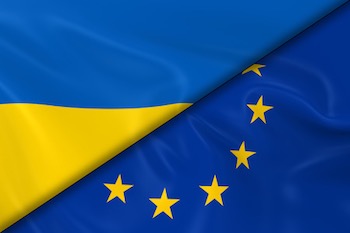 The distinctive character is one of the universally accepted criteria for registration of a sign as a trademark. This criterion is derived from the main function of a trademark, i.e. to distinguish the goods or services of one undertaking from those of other undertakings. This requirement is set out in Article 6quinquies (B) (2) of the Paris Convention for the Protection of Industrial Property and in the national laws of the countries that are parties to this Convention. Ukraine and the European Union (the “EU”) are no exception. Both in Ukraine (Article 6(2) of the Law of Ukraine “On Protection of Rights to Trademarks”) and in the EU (Article 3(1) of the EU Directive to approximate the laws of the Member States relating to trade marks), signs which are devoid of any distinctive character may not be registered as trademarks.
The distinctive character is one of the universally accepted criteria for registration of a sign as a trademark. This criterion is derived from the main function of a trademark, i.e. to distinguish the goods or services of one undertaking from those of other undertakings. This requirement is set out in Article 6quinquies (B) (2) of the Paris Convention for the Protection of Industrial Property and in the national laws of the countries that are parties to this Convention. Ukraine and the European Union (the “EU”) are no exception. Both in Ukraine (Article 6(2) of the Law of Ukraine “On Protection of Rights to Trademarks”) and in the EU (Article 3(1) of the EU Directive to approximate the laws of the Member States relating to trade marks), signs which are devoid of any distinctive character may not be registered as trademarks.
It should be noted that the laws define features that deprive a trademark of any distinctive character and thus disable its distinguishing function. Thus, for example, trademark registration must be denied to a realistic representation of the product itself.
However, Ukraine and the EU have different views on the application of this ground for refusal. The EU pursues a very scrupulous approach when granting legal protection to such trademarks, while the Ukrainian Patent Office adopts a “milder” approach in such cases.
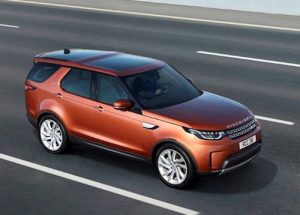 Thus, the world’s leading car producer JAGUAR LAND ROVER was denied registration of a shape trademark in the EU. The applicant filed six line drawings for the purpose of trademark registration of the shape of the body of its Range Rover Evoque motor vehicle, but the application was rejected. The European Union Intellectual Property Office (the “EUIPO”) found that the applied-for sign was devoid of any distinctive character as it was merely another variation of the typical shape of a car. This decision was further upheld by the Judgment of the General Court. In Ukraine, the carmaker simultaneously filed two applications with the Ukrainian Patent Office for registration of a side view and a 3/4 view of its Range Rover Evoque vehicle, but also received a preliminary refusal of registration. The Ukrainian Patent Office justified its refusal by arguing that the graphic sign applied for registration was actually the depiction of a certain car type and thus indicated the type of the product to be marked with the respective trademark. However, having challenged the preliminary refusal in the Appellate Chamber of the State Intellectual Property of Ukraine, the carmaker successfully obtained rights to both its trademarks applied for registration.
Thus, the world’s leading car producer JAGUAR LAND ROVER was denied registration of a shape trademark in the EU. The applicant filed six line drawings for the purpose of trademark registration of the shape of the body of its Range Rover Evoque motor vehicle, but the application was rejected. The European Union Intellectual Property Office (the “EUIPO”) found that the applied-for sign was devoid of any distinctive character as it was merely another variation of the typical shape of a car. This decision was further upheld by the Judgment of the General Court. In Ukraine, the carmaker simultaneously filed two applications with the Ukrainian Patent Office for registration of a side view and a 3/4 view of its Range Rover Evoque vehicle, but also received a preliminary refusal of registration. The Ukrainian Patent Office justified its refusal by arguing that the graphic sign applied for registration was actually the depiction of a certain car type and thus indicated the type of the product to be marked with the respective trademark. However, having challenged the preliminary refusal in the Appellate Chamber of the State Intellectual Property of Ukraine, the carmaker successfully obtained rights to both its trademarks applied for registration.
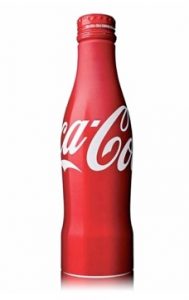 Another illustrative example proving that the EUIPO takes a very responsible attitude towards the granting of legal protection to shape trademarks and imposes special requirements for them is that in 2014 The Coca-Cola Company was denied registration of its new bottle design as a trademark. Coca-Cola attempted to trademark a new design of its plastic, glass and metallic bottles for soda drinks. The EUIPO found that the bottle shape had no distinctive character. The General Court upheld the EUIPO’s decision. In the court’s opinion, the company’s new bottle form without its iconic fluting used since 1915 did not differ substantially from other glass bottles available on the market. The judgment stated that the company’s bottles and cans did not have a sufficient number of characteristic features to be considered a trademark. “Although their form is somewhat original, Coca-Cola’s bottles and cans cannot be recognized as a trademark. It a mere variant of the shape and packaging of the goods concerned which will not enable the average consumer to distinguish the goods in question from those of other undertakings,” says the judgment of the European court.
Another illustrative example proving that the EUIPO takes a very responsible attitude towards the granting of legal protection to shape trademarks and imposes special requirements for them is that in 2014 The Coca-Cola Company was denied registration of its new bottle design as a trademark. Coca-Cola attempted to trademark a new design of its plastic, glass and metallic bottles for soda drinks. The EUIPO found that the bottle shape had no distinctive character. The General Court upheld the EUIPO’s decision. In the court’s opinion, the company’s new bottle form without its iconic fluting used since 1915 did not differ substantially from other glass bottles available on the market. The judgment stated that the company’s bottles and cans did not have a sufficient number of characteristic features to be considered a trademark. “Although their form is somewhat original, Coca-Cola’s bottles and cans cannot be recognized as a trademark. It a mere variant of the shape and packaging of the goods concerned which will not enable the average consumer to distinguish the goods in question from those of other undertakings,” says the judgment of the European court.
It should be noted, however, that The Coca-Cola Company successfully registered its bottle as a trademark in the USA, China, Japan, and Russia. In Russia, Coca-Cola registered its bottle shape as a trademark following a dispute with the Russian Patent Office, and in Japan following its dispute with the Japanese Patent Office and the Intellectual Property High Court.
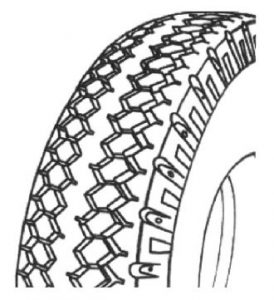 In its turn, the practice of the Ukrainian Patent Office demonstrates that the latter employs a more lenient approach to the granting of legal protection to shape trademarks. The most recent proof is the decision of the Ukrainian Patent Office on the basis of which in May 2016 a fragment of a tire was registered as a trademark (Certificate for the Trademark for goods and services N212281 DATED ON 25.05.2016). The characteristic feature of this tire was its tread, typical for most truck vehicles. The Patent Office did not question the distinctive character of the said sign, including in the context of vehicle tires, and at once issued its approval for the registration of the trademark.
In its turn, the practice of the Ukrainian Patent Office demonstrates that the latter employs a more lenient approach to the granting of legal protection to shape trademarks. The most recent proof is the decision of the Ukrainian Patent Office on the basis of which in May 2016 a fragment of a tire was registered as a trademark (Certificate for the Trademark for goods and services N212281 DATED ON 25.05.2016). The characteristic feature of this tire was its tread, typical for most truck vehicles. The Patent Office did not question the distinctive character of the said sign, including in the context of vehicle tires, and at once issued its approval for the registration of the trademark.
The above examples show that even though Ukraine’s and the EU’s laws have much in common, these countries’ approaches to their application are quite different. However, since the European integration has recently become an essential part of Ukraine’s internal affairs and the basic element of its development, we believe that the Ukrainian Patent Office will start tightening up its approaches to expert examinations and will thus approximate Ukraine’s practice to that of the EU.

![[IPWatchdog Logo]](https://ipwatchdog.com/wp-content/themes/IPWatchdog%20-%202023/assets/images/temp/logo-small@2x.png)
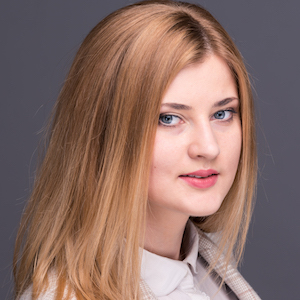
![[Advertisement]](https://ipwatchdog.com/wp-content/uploads/2024/04/Patent-Litigation-Masters-2024-sidebar-early-bird-ends-Apr-21-last-chance-700x500-1.jpg)

![[Advertisement]](https://ipwatchdog.com/wp-content/uploads/2021/12/WEBINAR-336-x-280-px.png)
![[Advertisement]](https://ipwatchdog.com/wp-content/uploads/2021/12/2021-Patent-Practice-on-Demand-recorded-Feb-2021-336-x-280.jpg)
![[Advertisement]](https://ipwatchdog.com/wp-content/uploads/2021/12/Ad-4-The-Invent-Patent-System™.png)







Join the Discussion
One comment so far.
angry dude
October 2, 2016 06:22 pmForgive me for discouraging comments, but “Ukrainian Patent Office” sounds like complete “gobbledygook” to me (that’s the term used by one of the scotus luminaries)
Not to be picky – “Russian patent office” sounds like gobbledygook too … and soon enough US Patent Office will join the ranks …
Amen, brothers and sisters…